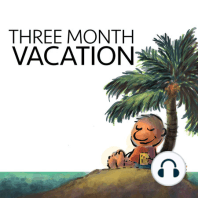21 min listen

The Unlikely Bestseller (And Why It Sold 2 Million Copies) - Part One
The Unlikely Bestseller (And Why It Sold 2 Million Copies) - Part One
ratings:
Length:
28 minutes
Released:
Sep 8, 2016
Format:
Podcast episode
Description
When Kathy Sierra sat down to write her book on JAVA, it wasn’t supposed to be a bestseller. They had incredible odds with over 16,000 other books on JAVA already on Amazon. And yet they cut through the noise? How did they do it? They didn’t pull the stunt that most Internet marketers do. Instead they focused on how people read and why they get to the finish line. The more the readers got to the end of the book, the more popular the book became in programming circles. ==================== To find out about their open secret, let’s take a trip into Kathy Sierra land. Part 1: Dependence on memory Part 2: Not Identifying Confusion Part 3: The Perfect Life ==================== It was the around the year 2000 Technology companies that just months prior were considered extremely, reported huge losses and folded. These losses created a economic cascade which came to be known as the dotcom crash. Stuck in the middle of this seemingly thermonuclear disaster were thousands of programmers. One of them was a woman called Kathy Sierra. If you’ve ever dipped your toes into the programming language, JAVA, you’re likely to have heard of Kathy Sierra Her book series “Headfirst Java” has sold well over a million copies. If you look back at the past ten years or more, there’s Sierra’s book—one of the longest running bestsellers of the decade. Yet, Sierra isn’t like one of those in-your-face Internet marketers. Her blog is untended. She jumped off social media back in 2007 and only reluctantly got back online in 2013. She speaks at conferences, but it’s a rare treat. But back to Sierra’s disaster story According to Sierra, back in the late nineties and in the year 2000, anyone landing a job in a dotcom company could get stock options. And then along came the implosion of the dotcoms, and her shares were worth nothing. And this is what Sierra says: “Anyway, I needed a job. I am probably as old as most of your parents. If you are trying to get a job as a programmer when you are competing against people who are half your age — and granted, I was not the most awesome programmer. I was very decent. And we needed regular income. I said we because, my husband, also a programmer, also the same age, same problem. And we had two kids and a dog.” In short, Kathy Sierra was seemingly at a dead end when she wrote her first book, “Headfirst Java”. Yet, Sierra believes in the concept of consumption. Consumption is when you create a product or service that’s so easy to understand and use, that progress is inevitable. Instead of floundering and flipping back to Page 3 or 6 or having to refer back, the reader is able to move forward confidently. Today we’re going to dig deep into that concept of consumption from a Sierra-point-of-view If you’ve followed Psychotactics, you’ll probably be more than aware that consumption has been a driving force of our business since 2006, possibly even earlier. However, I really like Kathy’s work. I really like her passion. I even like the name “a brain-friendly guide”—that’s the title on all her books. And though I won’t ever bother with Java, there are three concepts of Sierra’s consumption model I’d like to share with you. Ready? Well, here goes: Why do people/readers get stuck? Factor 1: Dependence on memory Factor 2: Not Identifying Confusion Factor 3: The Perfect Life. Let’s get cracking with the first element: dependence on memory. Factor 1: Dependence on Memory In a BBC documentary, Michel Thomas, master language teacher, looks around a classroom filled with desks. The sunlight is streaming through the windows, but Thomas’ face is slightly grim, as if he’s reaching for a painful memory. “This reminds me of my own classrooms”, he says. “As a child, as a youngster in high school. And it was (education) always under stress. One had to associate learning with work, with concentration, with paying attention, with homework. Work, it’s all work. But learning shouldn’t be work. It should be excitement. It should be pleasure. And o
Released:
Sep 8, 2016
Format:
Podcast episode
Titles in the series (100)
Why We Sell Less: The Root of Confidence: The hardest thing in business?or life is the factor of confidence. Whether you're in online marketing, selling products or services, or run a physical store, the confidence goes up and down. And yet, confidence is what creates sales. Sales, after all,... by The Three Month Vacation Podcast